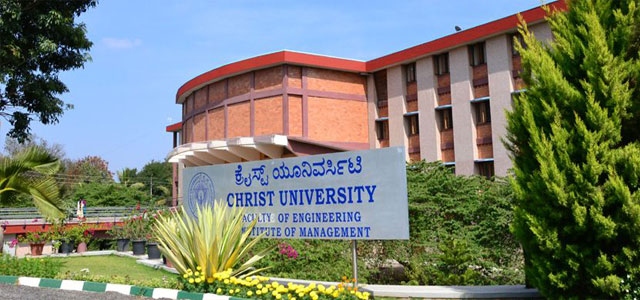CHRIST UNIVERSITY BTECH CIVIL ENGINEERING (CONSTRUCTION ENGINEERING & MANAGEMENT) COURSE OVERVIEW
The undergraduate engineering course focuses on the application of exploration, research, planning, analysis, design, construction, and operation of facilities required to maintain highways, bridges, tunnels, airports, railways, pipelines, dams, irrigation systems, towers, buildings, water supply, and waste management facilities. It is application-based and focuses on providing a strong foundation of knowledge and exposure to modern technology.
The course specializes in construction engineering and management under Civil Engineering. Employment opportunities are available in various specialized sectors of construction such as building, road, and bridge construction, infrastructure and management. Specialization in Artificial Intelligence (AI) and Machine Learning (ML) helps to develop and construct intelligent machines that can simulate human thinking, behavior, and learn from digital data.
Candidates who take up the BTech Civil Engineering (Construction Engineering & Management) course in Christ University Bangalore will graduate to become Civil Engineers who have diverse knowledge about the multiple applications of civil engineering to overcome the challenges of daily tasks.
Skills like rational thinking, project management, logical reasoning, critical-thinking, team work, planning, organization, decision-making, research, and entrepreneurship are enhanced through tools like case studies, presentations, seminars, internships, brainstorming, demonstrations, panel discussions, projects, workshops, industrial visits, and guest lectures included in BTech Civil Engineering (Construction Engineering & Management) in Christ University.
DURATION OF BTECH CIVIL ENGINEERING (CONSTRUCTION ENGINEERING & MANAGEMENT) COURSES IN CHRIST UNIVERSITY
- 4 years (8 semesters)
- Full time, Undergraduate Professional Program
AFFILIATION & APPROVALS
- Government of India
- Deemed-to-be University
- Accredited by NAAC
- Approved by AICTE
PROGRAM OBJECTIVES
- Fundamental knowledge and technical skills
- Prepare students to engage in scientific research.
- Skill development and enhancement.
- Academic, holistic, and social development of students.
- Create and develop a positive attitude for academic performance to support practical assignments.
- Facilitate and promote lifelong learning through skill development and interaction with industrial experts.
PROGRAM OUTCOME OF CHRIST UNIVERSITY BTECH CIVIL ENGINEERING (CONSTRUCTION ENGINEERING & MANAGEMENT)
- Graduates with a strong academic, technical, practical background.
- Graduates who are ready to engage in scientific research.
- Graduates with highly developed academic, holistic, and social skills.
- Graduates with a positive attitude for academic performance to support practical assignments.
- Graduates who are equipped with lifelong learning.
ELIGIBILITY OF BTECH CIVIL ENGINEERING (CONSTRUCTION ENGINEERING & MANAGEMENT) IN CHRIST UNIVERSITY
- The candidate should have obtained a minimum 50% aggregate in 10+2 level (Karnataka PUC/ISC/CBSE/NIOS/State Boards) with Physics, Chemistry, and Mathematics subjects from a recognized Board in India
- The candidate should have obtained 50% aggregate in Mathematics
- Candidates writing 10+2 examinations in March-May 2021 may also apply with their Class X and XI marks
- Candidates who have completed the 3-year Diploma in Engineering are eligible to apply for Lateral Entry
- Students pursuing International curriculum:
IB curriculum: must have 3 HL and 3 SL with 24 credits
GCE/Edexcel curriculum: must have a minimum of 3 A levels with a grade not less than C
- Preference for candidates who have qualified in Karnataka CET/COMED-K/JEE Advance/JEE-Main
- Qualification in Christ University Entrance Test
IMPORTANT DATE
Admission open - 03 January 2020
Admission close - 31 May 2021
FEE STRUCTURE FOR 2021
The fees structure for BTech Civil Engineering (Construction Engineering & Management) in Christ University can be summarized as:
Admission Registration: ₹5000
|
Karnataka |
Other States |
NRI |
SAARC/AFRICA/ OCI/PIO/ASIAN |
Other Foreign Nationals | |
|---|---|---|---|---|---|
|
First Year (Semester I, II) |
₹165000
| ₹165000 |
₹245000 |
$ 4000 |
$ 4500 |
|
Second Year (Semester III, IV) | ₹165000 | ₹165000 | ₹275000 | $ 4500 | $ 5000 |
|
Third Year (Semester V, VI) |
₹190000 | ₹190000 |
₹275000 |
$ 4500 |
$ 5000 |
|
Fourth Year (Semester VII, VIII) | ₹190000 | ₹190000 | ₹275000 | $ 4500 | $ 5000 |
APPLICATION PROCESS OF BTECH CIVIL ENGINEERING (CONSTRUCTION ENGINEERING & MANAGEMENT) IN CHRIST UNIVERSITY FOR 2021
Candidates frequently wonder what is the admission procedure for BTech Civil Engineering (Construction Engineering & Management) in Christ University? This can be summarized as:
- The candidates must apply online when the applications are available on the University website https://appstat.christuniversity.in
- Register with Name, Email ID and Password
- Fill all the information that is required
- Submit the Application Form
- Make payment using card and click on Submit
- A 9-digit Application Number will be generated
- Applications close approximately 1 week before the scheduled selection process
- Selection Process - Application Form printout, original documents and a set of photocopies on the allotted date, time and venue mentioned on the Admit Card
Required Documents:
- Copy of Class 10 and Class 11/ 12 Marks Card
- Transfer Certificate of Class 12
- Migration Certificate of Class 12 (except Karnataka state board applicants)
- Copy of valid ID proof (Aadhar Card/Aadhar Enrolment Receipt/PAN Card/Voter ID)
- PIO/OCI/SAARC/AFRICA/ASEA /OTHER FOREIGN NATIONALS Categories must send the required supporting documents – Copy of Passport, Copy of PIO/OCI Card, Copy of Class 10 & Class 11/12 Marks card)
- Recent passport size photograph (with white background)
ADMISSION FOR INTERNATIONAL STUDENTS
- The International Student Category includes Foreign Citizens/PIO Card Holders/OCI (Dual Citizens)
- The candidates from non-English speaking countries should produce evidence of passing the qualifying examination in English medium or have IELTS score 6.0/TOEFL (paper) 550/TOEFL (computer) of 213/TOEFL (IBT) of 79 scores
- Application Process – Direct Mode Application/Online Application Form
- The candidates will have to pay the International Student Category Fee
ADMISSION FOR NRI STUDENTS
- The candidates will have to pay the NRI Fee
- Foreign Venues for Selection Process: Kuwait and Dubai (UAE) and Doha (Qatar)
- Admission is based on academic performance and Selection
ADMISSION PROCESS FOR BTECH CIVIL ENGINEERING (CONSTRUCTION ENGINEERING & MANAGEMENT) IN CHRIST UNIVERSITY FOR 2021
Candidates frequently ask what is the admission process for the BTech Civil Engineering (Construction Engineering & Management) programme at Christ University Bangalore? The Admission Process includes:
- Selection Process: Christ University Entrance Test, Skill Assessment, Personal Interview, and Academic Performance in Class 10/12
- Selection Process results will be available on https://appstat.christuniversity.in
- Selected candidates will receive an E-Admission Letter
- The candidates must choose the preferred date and time from available options for the Admission Process
- The Fee payment has to be made through the online mode
- Presence of the candidate, original documents, and passport photograph of the candidate are mandatory
- Two copies of the Online Payment Receipt are mandatory
- All admitted students must open an account at South Indian Bank, CHRIST (Deemed to be University) Branch
MISCELLANEOUS INFORMATION
- A common question frequently asked by candidates is how can get direct admission for BTech Civil Engineering (Construction Engineering & Management) in Christ University? Christ University does not collect any type of Donation Fee
- If the Application Form is incomplete or incorrect, the University Management has the right to reject it
- Do not send any original documents through post or courier
- Ignorance of the Terms, Conditions and Guidelines will not be considered as an excuse
- There may be a periodic increase in Tuition Fees to meet the rise in costs
- Admitted students who require Bank Loan will be provided a recommendation letter on request
- The decision of the University Management and Admission Committee is final and binding
SYLLABUS FOR BTECH CIVIL ENGINEERING (CONSTRUCTION ENGINEERING & MANAGEMENT) IN CHRIST UNIVERSITY
| Year | Semester | Subject |
|---|---|---|
| Year I | Semester I |
|
| Semester II |
| |
| Year II | Semester III |
|
| Semester IV |
| |
| Year III | Semester V |
|
| Semester VI |
| |
| Year IV | Semester VII |
|
| Semester VIII |
|
CAREER SCOPE AFTER BTECH CIVIL ENGINEERING (CONSTRUCTION ENGINEERING & MANAGEMENT) IN CHRIST UNIVERSITY BANGALORE
There are plenty of career and job opportunities available in government and private companies and organizations for BTech Civil Engineering (Construction Engineering & Management) graduates.
Potential career roles are:
- Professor/Lecturer
- Civil Engineer
- Planning Engineer
- Site Engineer:
- Project Engineer:
- Quality Control Engineer
- Construction Engineer
- Entrepreneur
Popular companies that recruit BTech Civil Engineering (Construction Engineering & Management) graduates are:
- Infosys
- IBM
- HCL
- Amazon
- Mindtree
- Accenture
- Honeywell
- HP
- Mphasis
- Reliance
The average salary package for BTech Civil Engineering (Construction Engineering & Management) graduates is around 5 LPA to 12 LPA. The salary varies according to experience, specializations, professional certifications, and skills. The lowest salary package recorded was 4.5 LPA for fresh graduates and Trainees, and the highest salary package recorded was 25 LPA for Construction Engineers and Planning Engineers.
LOCATION
Kengeri Campus, Mysore Road, Bangalore

